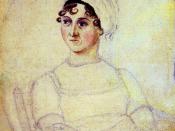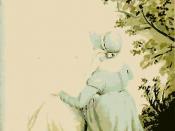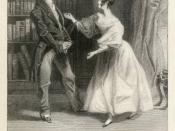Robyn Dennis
English IV
10/1/02
Jane Austen's Intentions for Satire
Although Jane Austen's Pride and Prejudice is a relatively straightforward and philosophically uncomplicated novel, Austen still endeavors to portray the deep and inescapable influence of bad manners regardless of class. In order to fulfill this purpose, Austen needed to create characters and situations that were humorous, yet easy to identify with and this was accomplished by the use of satire. Satire is used in the novel Pride and Prejudice and is particularly manifest in the characters Lady Catherine, Mrs. Bennet, and Mr. Collins in order to impart the reader with a genuine understanding of the consequences that ignorance, piety, pride, and prejudice produce in any class. The resulting effect of this device is laugh out loud humor and a marked disdain by the reader for these and any characters who possess a significant amount of the said unwanted qualities.
Beginning at the top of the social ladder, Austen uses satire through Lady Catherine to establish that no societal group is free from gross imperfection. Furthermore, exaggeration of Lady Catherine's denigrating personality reveals that the upper class contains some of the most offensive people out of all society. An example of this satire occurs when Lady Catherine calls on Elizabeth in order to ensure that there is no possibility of a union between Darcy and Elizabeth. In this scene, Austen uses Lady Catherine's exceedingly scurrilous and ludicrous treatment of Lizzy satirically in order to show that this type of patronization, irrespective of the period and despite being crude, is representative of a blemish that permeates throughout high society. The entire persona surrounding Lady Catherine is larger than life, but it is through this satire that the reader fully grasps the implications and feels the contempt for Lady Catherine's pride and...


